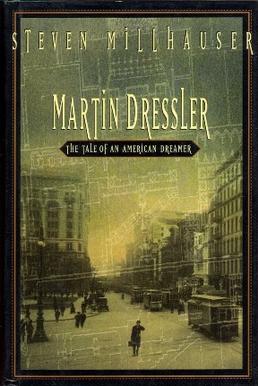
Martin Dressler: Tale
of an American Dreamer
by Steven Millhauser
Winner of the Pulitzer Prize 1997
This
book was read almost exclusively on a hammock, which ups the enjoyment factor
considerably.
As the
title suggests, this novel is about a man named Martin Dressler, an American
with a dream. Dressler is the son of hard-working but unimaginative immigrants
living in Manhattan in the 1880s. They own a struggling cigar shop, which
Martin helps out in. Throughout the novel Martin's life becomes defined by a
series of relatively bold moves. He begins arranging deliveries for his
father's store, opens a franchise, gets a job as a hotel employee, saves enough
to open a small cafeteria for lunch, and then begins to open new locations
throughout Manhattan. He is young, he is driven, but there always seems to be
something missing.
At
around this time he meets two sisters who live with their mother in his
apartment building. He eats dinner with them every night, and befriends them.
The two sisters are very different. Emmeline becomes his close friend and
confidant. He senses that she is most impressed with the empire he is building.
He eventually buys the hotel where he worked and begins to renovate it as a
combination hotel/apartment space with shopping opportunities. This is a bold
and innovative approach, and he gives Emmeline an important job at the hotel.
It is Caroline, her younger sister that he decides to marry. Caroline is an
enigmatic character. She is withholding, unimpressed by his achievements, and
decides to marry him for the sole reason that he has asked her. As the novel
progresses and Martin has success after success his marriage becomes more and
more distant, and Martin is unable to enjoy his accomplishments.
Again,
I want to acknowledge the role that my hammock played in my enjoyment of this
book. It is not as if I did not enjoy it, or find the themes interesting. It
was just such an odd book. The character of Martin was described the same way a
distant protagonist in a biography would be described. Until the last chapter
where there was no escape from the rather heavy symbolism, I was hard pressed
to remember that I was reading a work of fiction. He is driven by something
undefined, something that Steven Milhauser seems to be suggesting is distinctly
American. The problem, according to Milhauser, is that drive to achieve does
not necessarily lead to fulfillment but only a different kind of indefinable
emptiness. He is never satisfied by his achievements, but always asking
"What's next?" and moving on to another project. The relationship
that Martin has with his wife is part of this. He chooses a spouse who will not
be an equal, but will in fact always be an unobtainable absence. I know I
expected him to fall in love with Emmeline and be happy with her, but this is
not how the story turns out.
There
are definitely things I liked about this book. The faux-biographical
format--despite the way it made Martin's actions seem mysterious--made for a
quick read. The time period was an interesting choice as well. There was
something very Horatio Alger/rags-to-riches about putting this story in late
1800s New York. It was also interesting how Milhauser described the businesses
that Martin opened. They were filled with imagery of Americana, suggesting that
part of his appeal as a businessman was a sort of manipulation of imagery. I
don't know if the connection between these images and the ultimate failure of
the internal (and again, as Milhauser would describe as distinctly American)
drive to create something larger is as apparent as it could have been, but I
thought they were effective.
Coming soon: Possession by A.S. Byatt.

